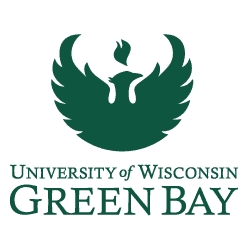Serenity Block (UWGB ‘23) has always loved writing. She knew from as young as elementary school that she wanted to be an author, but when college came around the corner, she looked for opportunities that could provide more than one writing route. The Writing and Applied Arts BFA at the University of Wisconsin – Green Bay offered just this.
She shares, “This degree felt like the perfect balance between creative writing and professional experiences in the publishing and editing industry. [It] offered me more options than I would get if I only had an education in creative writing, and I could still do the writing I loved.”
Serenity began her academic journey at the Marinette campus, earning her Associates Degree, before moving mostly online and receiving classes virtually from the main campus. Throughout her time at UWGB, Serenity has been co-editor-in-chief of the Northern Lights Literary and Arts Journal, studied abroad in Wales, and interned with the Pride Center. After graduating this spring, she plans to pursue book editing alongside working on her novel. Serenity very generously answered my questions below.

What is one aspect of your major that has surprised you?
I was shocked to learn about all the specific skills you could learn depending on which classes you took. There are classes for grant writing, game writing, novel writing, interactive storytelling, book editing, and more! In classes like ENG 224 (Northern Lights Practicum) and ENG 324 (Sheepshead Review Practicum), I was able to work on my copyediting skills along with learning how to put together literary journals. Next year, there will be opportunities to have a specific emphasis on my degree, like game writing or technical writing.
What has been your favorite part of your experience in the department?
I absolutely loved working with every creative writing professor I’ve taken a course with. There’s something so lovely about building your skills up with them to the point that you look back on your old works from before college knowing that you’ve improved tenfold.
You studied abroad in Wales last summer. What was that like? And what did you take away from the experience?
My trip to Wales last summer was great! Getting to work with a group of UWGB students and professors along with students and lecturers from Cardiff Metropolitan University was a blast. From a writing standpoint, you can do all the research in the world about a place, but nothing will ever replace the experience of being in the place itself and talking to locals. I highly recommend taking that course, or any trip that lets you experience the world. It provides plenty of writing inspiration and opportunities.
What course would you recommend for writing majors? For non-majors who want to take a writing class? What course had the biggest impact on you?
I would highly recommend that any writing majors interested in novel writing in particular take Dr. Meacham’s novel writing and revision workshops (ENG 305 and 306). You get to work with fellow students and Dr. Meacham to create a whole 50k word draft; it’s a lot of work, but it’s a great learning experience. The novel revision workshop helps you makes the many, many big changes required in a second draft.
For non-majors, I think that pretty much any introduction to creative writing course is a great way to improve any writing you might do, not just creative pieces. The more you work with words and grammar, the more naturally it will come to you in any circumstance with writing involved.
The courses that have most impacted me are the novel writing and revision workshops. Academics come pretty naturally to me, and these courses really challenged me in a way that I very rarely experience. They’ve changed my whole perspective on what it’s like to work on a project long-term and how to stick with it even when you’re tired of it.
What is something about the department that most people wouldn’t know?
Something most people don’t know about is that UWGB has its own publishing house called the Teaching Press. You can take a book-editing practicum where you work for the Press on a variety of projects and tasks in a space where students can feel safe in making mistakes.
What advice would you give students interested in the writing and applied arts major? And students who are just starting out in the major?
To anyone interested in the degree, I want them to know that there are so many things you can do with it, especially when the degree can include a specific emphasis starting next year. You don’t really notice the sheer amount of writing that needs to be done in order to get grant money, create a game, or clearly explain how to set up your new TV (or anything else that needs instructions).
To students just starting the major, just have fun with what you’re learning. You don’t have to love every book you read in a lit course or every project you work on in a creative writing class, but having fun with the things you do love makes the “bad” stuff a whole lot easier to get through.
And finally, what’s the best book you’ve read recently?
I read The Seven Husbands of Evelyn Hugo over break and absolutely adored it! It’s a pretty popular book online, and for me, it lived up to the hype.











